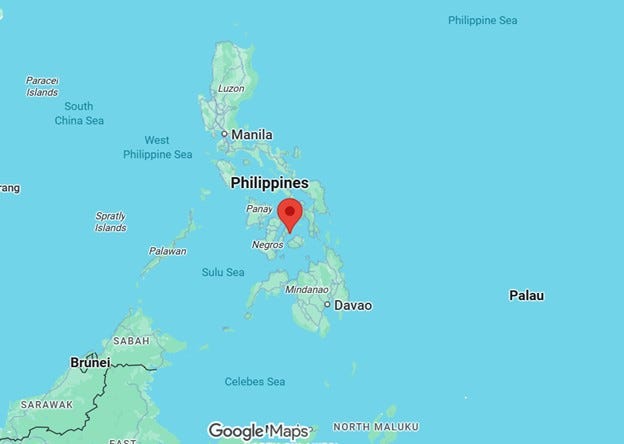100 Days After Marcos Calls For Reform in Scandal, Nobody’s Jailed
An angry nature continues to expose Philippine greed
By: Tita C. Valderama
The Philippines has been caught over recent weeks with a series of devastating typhoons and earthquakes that point up the country’s catastrophic level of disaster preparedness, exacerbated by outright theft of relief funds by congressmen and government officials who have been identified as alleged thieves in recent hearings and investigations. Nobody has been jailed.
The country is pounded by 18 to 20 typhoons per year and up to 850 earthquakes above magnitude 4. November has been no exception. Super Typhoon Fung-wong, known as Uwan in the Philippines, hit this weekend, churning its way across the main island of Luzon – right after Typhoon Kalmaegi, known locally as Tino, caused massive flooding last week on the island of Cebu. Tino left at least 204 people dead, 109 missing, and 156 injured in the year’s deadliest natural disaster. Cebu is still recovering from a 6.9-magnitude earthquake that struck five weeks ago and killed 79 people.
“We’re flooded to the max,” said a fuming Cebu Gov. Pamela Baricuatro, despite a P26 billion (US$439.9 million) allocation for flood control in the province. Baricuatro called for an investigation to pinpoint accountability for what many residents described as their most harrowing experience and their first brush with torrential flooding.
Cebu is supposed to benefit from 343 flood control projects recorded as completed between 2016 and 2022, and 168 more from 2022 to 2025.
Dikes, spillways, floodwalls along rivers or seawalls have been built with poor-quality materials, left unfinished, or were “ghost projects” that never existed despite funds being allocated for them, or paid in full.
“There’s nothing there, not even a single hollow block or cement. There was no equipment,” President Ferdinand Marcos Jr. marveled in August while inspecting one non-existent flood control project. “Everything there is a ghost project. There is clearly no work that has been done.”
Yet, with more than 100 days passed since Marcos voiced anger and frustration over massive corruption in government flood control projects, not a single person has been jailed. Ombudsman Jesus Crispin Remulla aims to file the first batch of cases to the antigraft court Sandiganbayan by November 25, but no plunder just yet.
Nonetheless, Public Works Secretary Vivencio Dizon said on November 3 he was “very confident” that of the 60 or so individuals, including Public Works officials and employees and private contractors identified as culprits, “many will spend Christmas behind bars.”
The Independent Commission for Infrastructure that Marcos created two months ago to investigate the multibillion-peso flood control projects has recommended to the Office of the Ombudsman the filing of criminal and administrative cases against two sitting senators, two former congressmen, a Commission on Audit commissioner, a resigned Cabinet secretary and his two deputies, several government engineers and private contractors perceived responsible for the systemic corruption in the projects.
The commission endorsed the filing of plunder and bribery charges against six public officials, including Senators Joel Villanueva and Jinggoy Estrada, for participating in an elaborate scheme devised by Bulacan district engineers to funnel kickbacks from flood control projects.
The National Bureau of Investigation has recommended the filing of corruption charges against former Senate president Francis Escudero, former senator and now Makati City Mayor Nancy Binay, and former House speaker Martin Romualdez, the resident’s cousin, over alleged kickbacks in public works projects.
Romualdez, who remains representative of Leyte in Congress, could face gross inexcusable negligence charges for his purported role in the appointment of resigned Ako Bicol Rep. Elizaldy “Zaldy” Co as chair of the appropriations committee and the latter’s connection to the anomalous flood control projects, according to Remulla.
Co, who has amassed a fortune estimated to be at least US$80 million through his construction companies, remains overseas in an undisclosed location, although he was last heard of in Boston. He shows no inclination to come back to the Philippines.
“Half of the country wants to throw him in jail and throw away the key. The other half wants to string him up by the nearest tree. Would you come home under those circumstances? I wouldn’t recommend that he come home,” said his lawyer.
Under Philippine law, gross inexcusable negligence carries an administrative penalty of dismissal, cancellation of eligibility, forfeiture of retirement benefits, and perpetual disqualification from holding public office. If the act also constitutes a crime, such as under the Anti-Graft and Corrupt Practices Act, criminal penalties like imprisonment (e.g., six years and one month to eight years) and perpetual disqualification can be imposed.
Low conviction rate
Critics have expressed impatience over the perceived delays in the filing of cases in court and sending of the culprits to jail. Marcos had said he wanted government prosecutors to make sure that the cases they will file are airtight to ensure conviction.
Not too long ago, Filipinos saw two former presidents arrested and jailed for plunder but later set free. Joseph Estrada was convicted by the Sandiganbayan in 2007 with a life sentence but pardoned by his successor, Gloria Macapagal Arroyo, who was acquitted by the Supreme Court in 2016 for insufficiency of evidence.
Three senators —Juan Pone Enrile, Jinggoy Estrada, and Ramon Revilla Jr. —implicated in the P10-billion pork barrel scam in 2013 were acquitted of plunder and graft one after the other, not because the crime did not happen. It was just that the prosecution failed to prove the guilt of the senators beyond reasonable doubt, meaning the pieces of evidence presented were not convincing enough to believe without any doubt that the accused were guilty of the crime.
The anomalies in the pork barrel cases happened between 2004 and 2010, during the presidency of now Pampanga Rep. Arroyo, who was arrested in October 2012 and kept under hospital arrest for nearly five years in connection with charges that she misused funds of the state-run Philippine Charity Sweepstakes Office during her presidency. In 2016, under the administration of Rodrigo Duterte, Arroyo was released after the Supreme Court found the evidence against her weak.
Estrada faced plunder charges and was convicted by the Sandiganbayan in September 2007 for accumulating approximately US$4 billion in ill-gotten wealth from illegal gambling, stock manipulation, and kickbacks. But barely a week after his conviction, the process for executive clemency started. After six weeks, Arroyo granted him pardon, restoring his civil and political rights, although forfeitures of his ill-gotten wealth remained in full force.
The 101-year-old Enrile, now Marcos’ chief legal counsel, was acquitted of plunder in October 2024. The Sandiganbayan said the prosecution failed to prove he received at least P50 million in kickbacks — the threshold for plunder. Last Oct. 24, the anti-graft court acquitted Enrile, his former chief of staff Jessica Lucila “Gigi” Reyes, and businesswoman Janet Lim Napoles of 15 counts of graft over their alleged involvement in pocketing P172.8 million of his pork barrel allocation. Napoles is serving a jail term for a separate plunder conviction for being the alleged mastermind of the P10-billion scam.
Because of the very low conviction rate, anti-corruption groups are wary about the administration’s commitment to get the culprits in the anomalous flood control projects convicted. As of July 2025, the Office of the Ombudsman has a conviction rate of 47.49 percent in Sandiganbayan cases. A separate report for the first half of the year showed a higher 61.36 percent conviction rate for all civil and criminal cases handled by its prosecutors (162 out of 264 decided cases), representing a significant increase from the previous year’s 45 percent.
Upcoming protests
Massive rallies are planned within the month, intensifying the call for transparency and accountability in government on the heels of destructive floodings in many parts of the country.
Iglesia ni Cristo, a Christian sect, set three-day gatherings in Rizal Park in Manila and at the People Power Monument in Quezon City from November. 16 to 18, expecting around 300,000 people to participate.
Organizers of the September 21 rally in Luneta and at the EDSA People Power Monument in Quezon City have scheduled another round of protest mobilization on November 30 to reiterate their call for accountability for officials deemed behind the large-scale and systematic corruption in the corruption-ridden flood control projects.
Aside from calls to hold those behind the flood control projects accountable, the November 30 protest will also demand scrutiny of the proposed 2026 budget, which has been reported to have retained pork barrel funding.
Several protest actions have also been lined up before the gathering,
including a noise barrage at the Office of the Ombudsman and a protest outside the Senate during the continuation of the blue ribbon committee’s hearing on November 14.
Independent commission’s recommendations
So far, the ICI has submitted its fourth referral to the Ombudsman either for further investigation or filing of charges against incumbent and resigned officials and private contractors behind anomalous flood control projects.
Answering questions from the media on November 6 at the ICI Office in Taguig City, Chair Andres Reyes Jr. held a placard that says, “What the world needs now is love not greed and selfishness.” He endorsed to the Ombudsman the investigation of former officials of the Department of Public Works and Highways in relation to irregularities in a P95-million slope protection structure and waterways in Bocaue, Bulacan for potential violations of the Code of Conduct and Ethical Standards by former secretary Manuel Bonoan and former undersecretaries Roberto Bernardo and Maria Catalina Cabral.
The ICI also recommended that the Ombudsman evaluate whether the following individuals have violated the anti-graft, malversation and other pertinent laws: former DPWH Bulacan first district engineer Henry Alcantara, former district assistant engineer Brice Hernandez, engineers Jaime R. Hernandez, Ernesto C. Galang, John Carlo C. Rivera, John Michael E. Marcos, Claudine Magdalene Magsakay, Ericka Justine P. Chico, and Mr. Allan Payawal.
A similar recommendation has been forwarded in connection with the P72-million flood control project in Plaridel, Bulacan.
On October 29, the ICI recommended criminal and administrative cases be filed against Sen. Jinggoy Estrada, Sen. Joel Villanueva, resigned Ako Bicol party-list Rep. Elizaldy “Zaldy” Co, Commission on Audit Commissioner Mario Lipana, former Caloocan Rep. Mitch Cajayon-Uy.
On September 29, the commission submitted its first referral to determine appropriate charges to be filed against 18 public officials, including Co. This was specifically in connection with the alleged irregularities plaguing the P289.5-million flood control project in Naujan, Oriental Mindoro.
On September 11, the DPWH filed criminal complaints against 20 agency officials, mostly from Bulacan, as well as four contractors tagged in the anomalous flood control projects before the Office of the Ombudsman. The complaints include violations of the anti-graft and corrupt practices and government procurement act, as well as malversation of public funds, which are non-bailable offenses, according to Dizon.
Assistant Ombudsman Mico Clavano said that while sending the culprits to jail by Christmas “is definitely the goal,” he cautioned about the requirement of the law for due process, in which those accused are given adequate and reasonable notice of the charges and a chance to respond to the complaints and defend themselves against the accusations.


